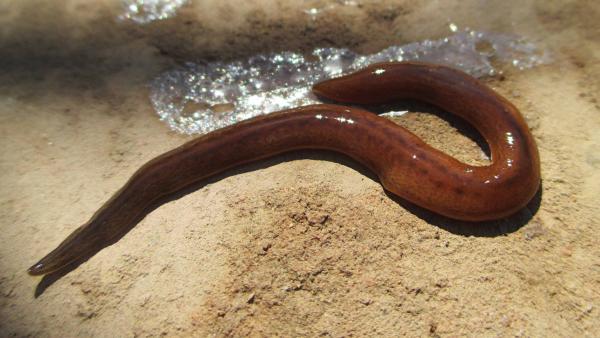The Obama flatworm (Obama nungara) which can grow up to 7cm long and has hundreds of tiny eyes distributed across the length of its body has been discovered thriving in the rice paddies of the Parc Natural de L'Albufera in Valencia.
Named after the Brazilian Tupi words for leaf (oba) and animal (ma) – and not for any connection with former US President Barrack Obama – the is a species of land planarian that is thought to have crossed the Atlantic into Europe via exotic pot plants imported from Brazil.
These flatworms prey on earthworms and land snails and pose a threat to the native earthworm population considered essential for soil health, as they aerate and fertilise the earth, maintain its structure and support plant growth.
Not only would the diminishing native invertebrate population have a negative impact on soil quality – making soil less able to absorb water and therefore increase flood risk but also affect crop production, but the invasive species could have a huge impact higher up the food chain, affecting bird life.
They have no known natural predators as are apparently foul tasting that birds would not attempt to eat one more than once.
Conservationist group SEO / Birdlife has raised the alarm over the Obama worms.
??? Los voluntari@s de #LIFEFollowers son la caña!!! No se les escapa ninguna especie exótica invasora ?#EEI que esté en la red #NATURA2000 @LIFEprogramme https://t.co/Aa73o0Y484 #Followers #FollowNature Gracias por vuestro trabajo! ??? pic.twitter.com/TNzz6FRSyS
— SEO/BirdLife (@SEO_BirdLife) July 22, 2019
“Due to its route of entry through potted plants the invasive exotic planarian have can become abundant in certain areas, such as like gardens, parks, nurseries or garden centers,” the NGO said in a statement.
“Although their impact on local biodiversity may seem minor, since they are generalist predators of terrestrial invertebrates, such as earthworms and native snails, the settlement of a population of these species could have a negative impact on the natural spaces it colonizes.”



 Please whitelist us to continue reading.
Please whitelist us to continue reading.
Member comments